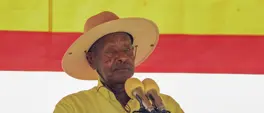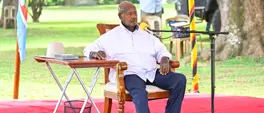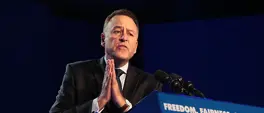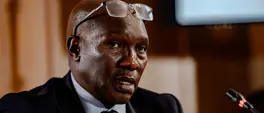CHARLES MATSEKE | Madlanga commission: Masemola’s evasions expose SAPS complicity in disbanding political killings task team
Charles Matseke
23 September 2025 | 12:10'To suggest that Masemola could be 'coerced' into disbanding the PKTT whether by Mchunu or Sibiya is to fundamentally misunderstand his office, or worse, to trivialize the solemn oath he swore,' says Charles Matseke.
- South African Police Service (SAPS)
- Police inquiry
- Police Crisis
- Fannie Masemola
- Madlanga Commission of Inquiry
- Cyril Ramaphosa
- Senzo Mchunu
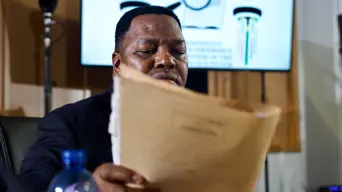
National Police Commissioner Fannie Masemola testifies at the Madlanga Commission of Inquiry, sitting at the Brigitte Mabandla Justice College in Pretoria on 23 September 2025. Picture: Katlego Jiyane/EWN
Day four of the Madlanga Commission of Inquiry revealed not clarity, but a deliberate choreography of evasion.
The testimony of General Fannie Masemola, South Africa’s national police commissioner, was emblematic of this malaise: a pattern of running in circles designed to blur responsibility while avoiding the piercing truth that the disbandment of the Political Killings Task Team (PKTT) may well constitute a dereliction of constitutional duty.
Masemola’s claim that he acted on instructions from Minister of Police Senzo Mchunu, and that Mchunu’s directive was decisive, collapses under constitutional scrutiny. By his own admission, the minister of police only possesses authority in terms of policy directives and legislation, not operational decisions.
The operational command of the South African Police Service is vested solely in the national commissioner, whose oath of office obliges him to serve the Republic without fear or favour, to protect the Constitution, and to ensure that the law is applied even against political elites. To suggest that Masemola could be “coerced” into disbanding the PKTT, whether by Mchunu or Sibiya, is to fundamentally misunderstand his office, or worse, to trivialise the solemn oath he swore.
This raises the central question that Justice Madlanga himself did not pose: If Masemola knew the order to disband the task team was unlawful, why did he not challenge it as an officer of the law? His silence speaks louder than his evasions. It suggests complicity masked as victimhood.
Yet, the Commission itself has been careful not to pierce too deeply. Lines of questioning have been curated to construct false equivalences, creating a narrative in which systemic constitutional failure is reduced to the mistakes of individuals. Parliament's ad hoc committee, one hopes, will pursue a sharper line of accountability than this carefully staged theater.
The focus on whether President Ramaphosa knew of Mchunu’s directive is a distraction. The President, as the primary client of state intelligence, receives daily reports on the functioning of his Cabinet. To pretend otherwise is to insult public intelligence. This hype, manufactured as nuance, serves only to reposition Mchunu as a fall guy while shielding Ramaphosa from scrutiny.
The deeper rot is not the directiveitself but the proximity between the state and South Africa’s criminal-political elites. The disbandment of the PKTT was not an administrative error; it was the calculated neutralisation of an investigative unit whose reach threatened the untouchables of the Saxonwold–Sandton corridor, Africa’s richest square mile, where the country’s ultra-elites politicians and gangsters alike co-mingle in impunity.
The Commission’s own protection of the so-called “Big Five” ultra-elites, whose names have been classified for “political reasons”, demonstrates how accountability is being carefully managed to preserve the illusion of justice while safeguarding power.
The sudden disappearance of CAT VIP Protection Services’ website, likely to erase records of its directors, such as Hangwani Morgan Maumela, further illustrates how digital erasure is used to sanitise inconvenient truths.
This is where theory illuminates reality. Chaos Theory’s butterfly effect teaches us that small acts such as the disbandment of a single task team can unleash cascadingconsequences, destabilising entire systems.
The PKTT’s erasure has emboldened assassins, delegitimised the SAPS, and undermined public trust in constitutional governance.
Meanwhile, Game Theory reveals the rational choices of self-preservation at play: Masemola positions himself as victim, Mchunu is cast as fall guy, and Ramaphosa shields his office from reputational harm. Each actor pursues survival within a corrupt equilibrium, while the constitutional order, the ultimate player, is treated as expendable.
South Africa stands, once again, at the edge of a familiar precipice: commissions that promise truth but deliver managed narratives, institutions hollowed by elite capture, and a populace manipulated into consent. The Madlanga Commission may well conclude without addressing the fundamental breach, which is the betrayal of the national commissioner’ oath and the ongoing collusion between the state and organised crime.
If South Africa is to escape this cycle of manufactured crises, we must insist not only on sharper questioning, but on constitutional fidelity: that those entrusted to execute the law mustdo so even when it turns against the powerful. Anything less is not governance, but complicity.
Charles Matseke (MPhil in Politics and International Relations) is a researcher and writer with a keen interest in contemporary political dynamics. His research focuses on electoral politics, foreign policy analysis, and international relations, with a particular emphasis on the Global South and Africa's role in global affairs.
Get the whole picture 💡
Take a look at the topic timeline for all related articles.


